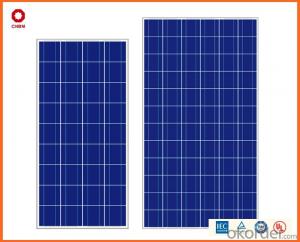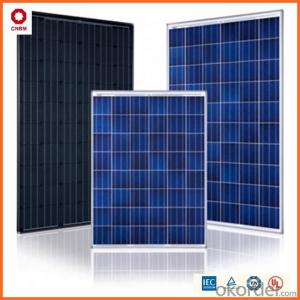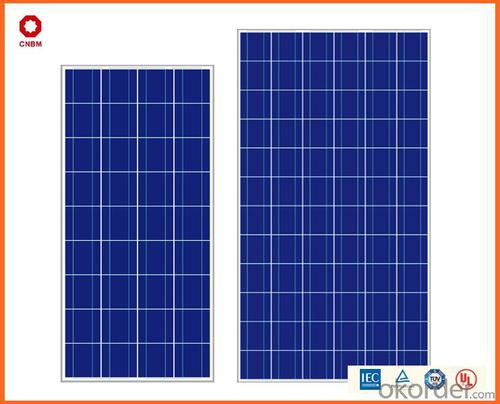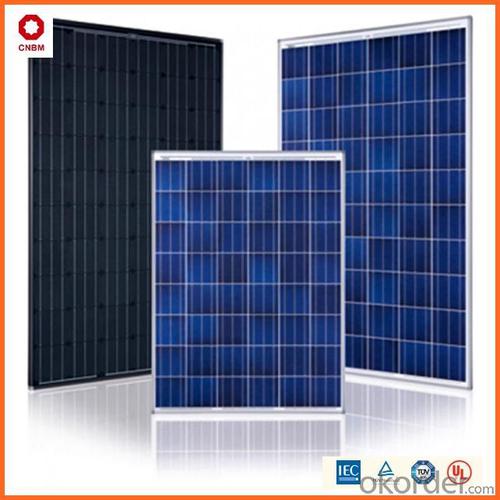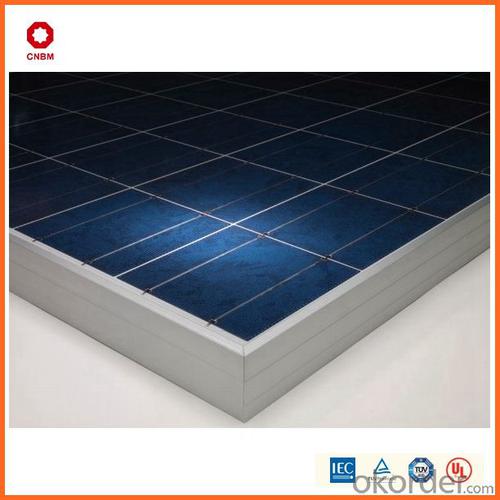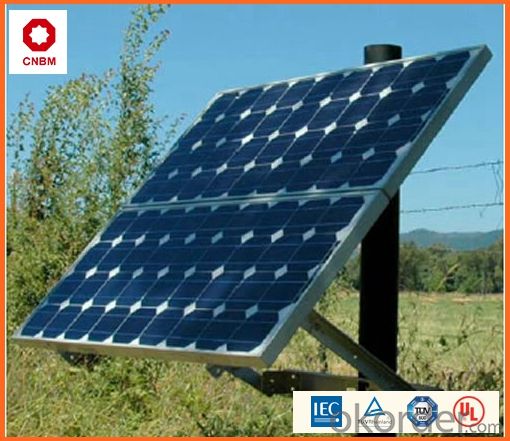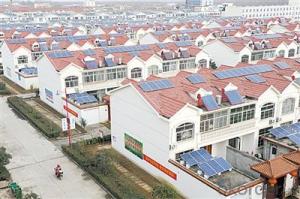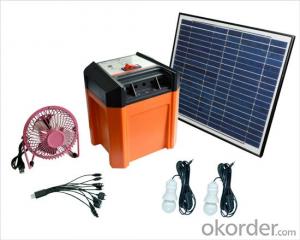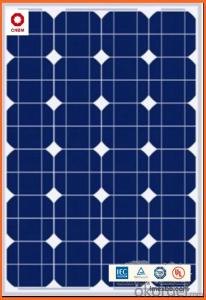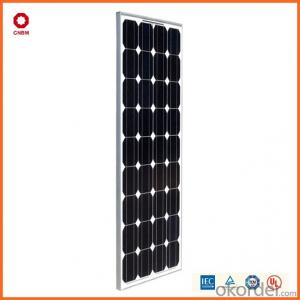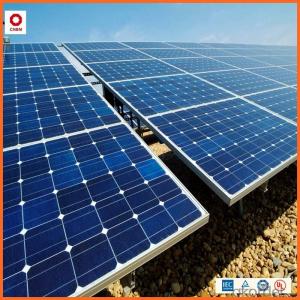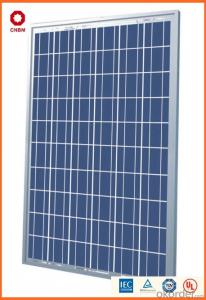Alpha Solar Energy Systems - Hot on Sale! Stock Small Solar Panel 75w with Good Quality
- Loading Port:
- China main port
- Payment Terms:
- TT OR LC
- Min Order Qty:
- 1 watt
- Supply Capability:
- 10000000 watt/month
OKorder Service Pledge
OKorder Financial Service
You Might Also Like
Product Description:
Hot Sale !!! Quality and Safety of Small Poly Solar Panel 35~85w
1. Rigorous quality control meets the highest international standards.
2. High-transmissivity low-iron tempered glass, strong aluminium frame.
3. Using UV-resistant silicon.
4. IS09001/14001/CE/TUV/UL
Warranties of Small Poly Solar Panel 35~85w
1. 10 years limited product warranty
2. 15 years at 90% of the minimal rated power output
3. 25 years at 80% of the minimal rated power output
Technical date of 45w-85w Poly Solar Panel
ITEM NO.: | Mono 125*125 cell ,36pcs . Power range from 80Wp-100Wp | ||||||||
Maximum Power(W) | 80 | 85 | 90 | 95 | 100 | ||||
Optimum Power Voltage(Vmp) | 17.81 | 17.89 | 17.94 | 17.99 | 18.06 | ||||
Optimum Operatige Current(Imp) | 4.78 | 4.91 | 5.12 | 5.35 | 5.59 | ||||
Open Circuit Voltage(Voc) | 21.98 | 22.05 | 22.14 | 22.28 | 22.45 | ||||
Short Circuit Current(Isc) | 4.95 | 5.15 | 5.36 | 5.65 | 5.84 | ||||
Solar Cell: | 125*125 Mono | ||||||||
Number of Cell(pcs) | 4*9 | ||||||||
Brand Name of Solar Cells | JA Cell, Bluesun Cell | ||||||||
Size of Module(mm) | 1580*808*35 | ||||||||
Caple & Connector Type | Pass the TUV Certificate | ||||||||
Frame(Material Corners,etc.) | Aluminium-alloy | ||||||||
Backing (Brand Type) | TPT | ||||||||
Cell Efficiency for 100W(%) | 15.8% | ||||||||
Weight Per Piece(KG) | 12.0KG | ||||||||
FF (%) | 70-76% | ||||||||
Junction Box Type | Pass the TUV Certificate | ||||||||
Tolerance Wattage(e.g.+/-5%) | ±3%, or 0-3% | ||||||||
Front Glass Thikness(mm) | 3.2 | ||||||||
Temperature Coefficients of Isc(%) | +0.04 | ||||||||
Temperature Coefficients of Voc(%) | -0.38 | ||||||||
Temperature Coefficients of Pm(%) | -0.47 | ||||||||
Temperature Coefficients of Im(%) | +0.04 | ||||||||
Temperature Coefficients of Vm(%) | -0.38 | ||||||||
Temperature Range | -40°C to +85°C | ||||||||
Surface Maximum Load Capacity | 2400Pa | ||||||||
Allowable Hail Load | 23m/s ,7.53g | ||||||||
Bypass Diode Rating(A) | 12 | ||||||||
Warranty | 90% of 10 years,80% of 25 years. | ||||||||
Standard Test Conditions | AM1.5 1000W/ 25 +/-2°C | ||||||||
Packing | carton or pallet | ||||||||
1*20' | 25 Pallets / 450pcs | ||||||||
1*40'STD | 25 Pallets / 100pcs | ||||||||
Features of our products:
• High conversion efficiency mono/poly-crystalline amorphous silicon solar cells
• Modules incorporate high performance bypass diodes to minimize the power drop caused by shading
• High transmittance, low-iron tempered glass
• High performance EVA encapsulant to prevent destroying and water.
• AI frame: without screw, corner connection. 8 holes on the frame can be installed easily
• Good performance of preventing from atrocious weather such as wind and hails
• Certifications: CE IEC TUV VDE UL, Class I
• 10 years 90% power output warranty

Shipping of Small Poly Solar Panel 35~85w
By Sea | Delivery from Shanghai or Ningbo seaport |
By Air | Departure from Shanghai Pudong Airport |
By Express | Post by DHL, EMS, UPS, TNT. |
- Q: Can solar energy systems be used for powering electric fences?
- Yes, solar energy systems can be used for powering electric fences. Solar panels can generate electricity from sunlight, which can then be stored in batteries and used to power electric fences. This is a sustainable and cost-effective solution, especially in remote areas where access to electricity may be limited.
- Q: What is the role of solar energy systems in reducing energy inequality?
- Solar energy systems play a crucial role in reducing energy inequality by providing affordable and sustainable energy solutions to underserved communities. These systems can be easily installed in remote areas, enabling access to electricity in regions that are often overlooked by traditional energy infrastructure. By harnessing the power of the sun, solar energy systems offer a renewable and clean alternative, reducing the dependence on fossil fuels and lowering energy costs for disadvantaged households. Additionally, solar energy can empower communities by providing job opportunities in the installation and maintenance of these systems, stimulating local economies and fostering self-sufficiency.
- Q: Can solar energy systems be used for powering electric battery manufacturing plants?
- Electric battery manufacturing plants can use solar energy systems to power their operations. Solar energy is a renewable and clean source that can be converted into electricity through photovoltaic (PV) panels. These panels capture sunlight and convert it into usable electricity. This electricity can then be utilized in various industrial processes, including electric battery manufacturing. To implement solar energy systems, manufacturing plants can install PV panels on their rooftops or in nearby open spaces. This allows them to directly power their operations, reducing their dependence on fossil fuel-based power and lowering greenhouse gas emissions. Additionally, any excess electricity generated can be stored in batteries for later use, ensuring a steady power supply even during periods of low sunlight. By embracing solar energy systems, electric battery manufacturing plants can make significant strides in reducing their carbon footprint and contributing to a more sustainable energy future. This not only supports global efforts against climate change but also helps in cutting down operational costs associated with traditional power sources.
- Q: Can solar energy systems be used in areas with limited access to solar energy insurance coverage?
- Yes, solar energy systems can still be used in areas with limited access to solar energy insurance coverage. While insurance coverage may provide financial protection in case of damage or malfunction, it is not a requirement for the installation and operation of solar energy systems. However, it is advisable to thoroughly assess potential risks and consider alternative risk management strategies in the absence of proper insurance coverage.
- Q: How do solar energy systems handle power outages?
- Solar energy systems can handle power outages in two different ways, depending on the type of system being used. Firstly, grid-tied solar energy systems, which are connected to the utility grid, do not typically provide power during an outage. This is because they are designed to automatically shut down when the grid goes down to prevent any electrical energy from being fed back into the grid. This is done to protect utility workers who may be making repairs on the grid. So, during a power outage, grid-tied solar energy systems will not provide electricity to the home or building they are installed in. On the other hand, off-grid solar energy systems, which are not connected to the utility grid, are designed to operate independently and can provide power during a power outage. These systems typically consist of solar panels, a charge controller, a battery bank, and an inverter. The solar panels collect sunlight and convert it into electricity, which is then stored in the battery bank through the charge controller. The inverter then converts the stored DC (direct current) electricity into AC (alternating current) electricity, which can be used to power appliances and electrical devices in the home or building. This allows off-grid solar energy systems to continue providing electricity even when there is a power outage. It is important to note that the amount of power available during a power outage from an off-grid solar energy system will depend on the capacity of the system's battery bank. If the battery bank is fully charged and has enough capacity, it can provide power for a certain period of time. However, if the power outage lasts for an extended period or if there is limited sunlight to recharge the batteries, the system's power supply may eventually be depleted. Overall, while grid-tied solar energy systems do not provide power during power outages, off-grid solar energy systems can offer a reliable source of electricity during such situations, provided they have sufficient battery capacity and sunlight is available for recharging the batteries.
- Q: What is the role of solar energy systems in achieving energy independence?
- Solar energy systems play a crucial role in achieving energy independence by reducing reliance on traditional fossil fuel sources and providing a sustainable and renewable alternative. Solar power systems harness the energy from the sun and convert it into usable electricity, allowing individuals, communities, and even entire countries to generate their own power. One of the main advantages of solar energy systems is their ability to be installed almost anywhere, from residential rooftops to large-scale solar farms. This decentralization of power generation ensures that energy can be produced and consumed locally, reducing the need for long-distance transmission lines and minimizing transmission losses. By generating electricity on-site, solar energy systems contribute to energy independence by eliminating dependence on the grid and the associated costs and vulnerabilities associated with it. Solar energy systems also have a positive environmental impact. Unlike fossil fuels, solar power does not produce harmful emissions or contribute to climate change. By utilizing solar energy, countries can reduce their carbon footprint and work towards meeting their climate goals. Additionally, solar power systems can help reduce the need for environmentally damaging practices such as mining and drilling for fossil fuels. Moreover, solar energy systems contribute to energy independence by providing a stable and predictable source of energy. Unlike fossil fuels, which are subject to price fluctuations and geopolitical tensions, sunlight is readily available and free. By investing in solar energy systems, countries can reduce their vulnerability to energy price shocks and geopolitical dependencies, ensuring a stable and secure energy supply. Furthermore, solar energy systems promote economic growth and job creation. The installation, maintenance, and operation of solar power systems require a skilled workforce, leading to the creation of new jobs and economic opportunities. By investing in solar energy, countries can stimulate their local economies, reduce energy imports, and redirect energy spending towards domestic sources. In conclusion, solar energy systems are essential in achieving energy independence by reducing reliance on fossil fuels, promoting sustainability, offering stable and predictable energy sources, and contributing to economic growth. By embracing solar power, countries can not only secure their energy supply but also contribute to a cleaner and more sustainable future.
- Q: Can solar energy systems be used for powering wineries?
- Certainly, wineries can make use of solar energy systems to power their operations. Solar power is an eco-friendly and renewable energy source that can offer a consistent and dependable supply of electricity for winemaking activities. Various processes in wineries, including grape crushing, fermentation, cooling, bottling, and storage, demand a substantial amount of energy. On that note, by installing solar panels, wineries can produce their own electricity, reducing their dependence on fossil fuels and decreasing their carbon footprint. It is possible to install solar energy systems on winery buildings' rooftops or in nearby open spaces like vineyards. These systems consist of solar panels that convert sunlight into electricity using the photovoltaic effect. The generated electricity can be directly used to power winery operations or stored in batteries for later use, ensuring a constant power supply even during cloudy days or at night. One of the significant advantages of adopting solar energy in wineries is the potential for long-term cost savings. Although the initial installation cost of solar panels may be relatively high, the operational expenses are considerably lower compared to conventional energy sources. Once the solar system is in place, wineries can enjoy reduced or even eliminated electricity bills, resulting in substantial savings over the system's lifespan. Furthermore, solar energy systems for wineries can be customized to meet specific energy requirements. By conducting a thorough energy assessment, wineries can determine their electricity demand and tailor the solar system accordingly. This allows wineries to have a personalized solution that fulfills their energy needs and ensures optimal performance. Besides the financial and environmental benefits, employing solar energy in wineries can also enhance their brand image and reputation. With consumers becoming increasingly conscious of sustainability and environmentally friendly practices, wineries that demonstrate a commitment to clean energy can attract eco-conscious customers. As a result, this can lead to increased sales and customer loyalty. In conclusion, solar energy systems present a practical and efficient option for powering wineries. By harnessing the sun's power, wineries can reduce their reliance on conventional energy sources, cut down on operating costs, and contribute to a greener and more sustainable future.
- Q: Can solar energy systems be used for indoor lighting?
- Yes, solar energy systems can be used for indoor lighting. Solar panels can be installed on rooftops or in outdoor areas to capture sunlight, which is then converted into electricity and stored in batteries. This stored energy can be used to power lights indoors, providing a sustainable and cost-effective lighting solution.
- Q: Can solar energy systems be used in areas with protected wildlife habitats?
- Yes, solar energy systems can certainly be used in areas with protected wildlife habitats. In fact, solar energy is considered to be one of the most environmentally friendly energy sources available, making it a suitable choice for such areas. Proper planning, design, and installation can help minimize any potential impacts on wildlife habitats. Additionally, solar energy systems can often be installed on rooftops or existing infrastructure, reducing the need for additional land disturbance.
- Q: Can solar energy systems be used in apartment buildings or multi-unit dwellings?
- Yes, solar energy systems can be used in apartment buildings or multi-unit dwellings. In fact, they are increasingly being implemented in such settings to meet the energy needs of multiple households. Solar panels can be installed on the rooftops of apartment buildings, and the generated energy can be shared among the units. This allows for a sustainable, cost-effective, and environmentally friendly energy solution for these types of residential complexes.
Send your message to us
Alpha Solar Energy Systems - Hot on Sale! Stock Small Solar Panel 75w with Good Quality
- Loading Port:
- China main port
- Payment Terms:
- TT OR LC
- Min Order Qty:
- 1 watt
- Supply Capability:
- 10000000 watt/month
OKorder Service Pledge
OKorder Financial Service
Similar products
Hot products
Hot Searches
Related keywords

